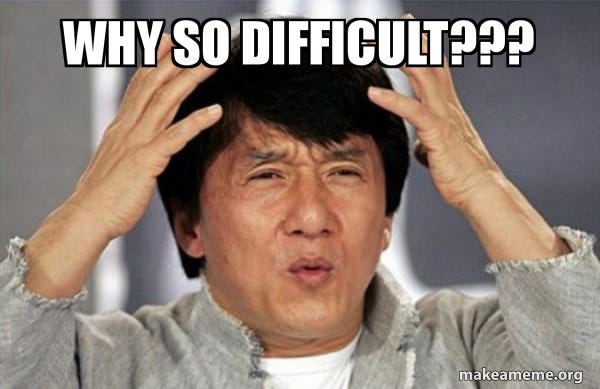During the 1980s, John Sweller pioneered Cognitive Load Theory while investigating how learners solve problems.
He discovered that when people are overloaded with sensory information, they forget key knowledge and make poor decisions.
Cognitive load is your brain’s bandwidth. Recently, Forbes called it “the most important employee performance metric for the next 10 years”.
I’d argue it’s even more important for solopreneurs.
Secret to Success: Make things simple (for you and your audience)
In this newsletter:
How to make your business decisions easier.
How to make your audience's decision to buy from you easier. For paid subscribers only.
How to make your business decisions easier.
“The diet industry has always been *weirdly* complex — calorie counting, fasting, tracking macros. It feels impossible to navigate.
In 1961, Jean Nidetch started a support group for women trying to lose weight. She named it WeightWatchers.
Nidetch knew information overload made weight loss daunting (so people didn’t commit). So they rewrote the rule book with their pioneering points system.” — Katelyn Bourgoin, marketer
Online business is complex too, but it doesn’t have to be.
Solopreneurship is about the what.
What are you selling and what makes it different? That’s all.
You must’ve heard that it’s all about the why. I’m sorry, but I don’t buy it.
I once asked a client of mine, an owner of a store for pet supplies, why he had started his business. He said, “Honestly, for the money.”
Not very inspirational? So what?
He still offers an amazing selection of products (he’s the only one in Bulgaria who imports our dog’s diet food) and he recently opened his 8th brick-and-mortar store (after starting with just an online shop).
It’s not his why that made him successful, it was his what: he offered quality products for pets, often products that can’t be found anywhere else.
If you clarify your “what”, everything else comes into focus.
And today, I’ll help you do just that.
Take a pen and paper, or open a text file on your computer.
Did you do it yet?
I’ll wait.
Okay, I hope you did it.
Now, answer these 13 questions. By the end of it all, you’ll know exactly what you’re about, what’s your brand and what’s your core offer.
Questions:
What are you naturally attracted to? Reading? Writing? Watching videos? Recording videos? Serving clients? Selling products? What do you honestly like? Note: forget what others are doing or say you should do.
2. Who’s your favourite role model? Why? The things that stand out to you are things you probably want in your own brand, if reframed a little.
3. Do you work better alone or with people? This will tell you a lot about whether you should work with clients & partners, or prefer more solitary days.
4. Are you a good listener or a good talker? Good listeners should make their brands consumer-centric. They’ll always find it easy to give people what they want. Good talkers are good leaders. They’ll find it easy to inspire and teach what they find useful; to share their own experiences.
5. Ask 5 people about your 3 best qualities. I know this can be embarrassing, but you can do it. You can message friends with something along the lines of, “I’m doing a personal branding exercise, and I’d really appreciate your help. Could you tell me what you think are my 3 best qualities? Thank you!”
6. How results-driven are you on a scale of 1 to 10, where 10 is super results-driven? Anything over 5 means you’d be great at helping people optimize their immediate results: get more views, more followers, make more money, try new platforms/channels, maybe lose weight faster, etc. You’d also make a great copywriter/marketer. Anything under 5 means you’d be better at helping people strategize, inspiring them and pointing them in the right direction when they’re at a crossroads (so, all the time). Maybe you’d teach them how to change their lifestyle instead of how to lose 5 pounds for a wedding. You’d also make an excellent coach.
7. Choose up to 2 benefits of this list, a main one and a secondary one:
Do you make things easier?
Do you make things better (including more fun)?
Do you make things faster?
Do you make things cheaper/more profitable?
8. What are the top 3 strongest beliefs you’d like your audience to know you for?
9. Who do you want to serve? Think psychographic, not demographic (unless you have a very clear demographic answer). Fit your answer into fewer words. Solopreneurs. Writers. Moms. High achievers. Athletes. People with low confidence.
10. What can you keep doing even when you don’t feel very energetic?
11. What content/products/services do you like? What do you like about them?
12. What sales strategies work on you? What makes you buy?
13. What’s your history? What are the stories/moments that defined who you are?
How to make your audience’s decision to buy from you easier.
Keep reading with a 7-day free trial
Subscribe to Smarter Solopreneurs to keep reading this post and get 7 days of free access to the full post archives.




